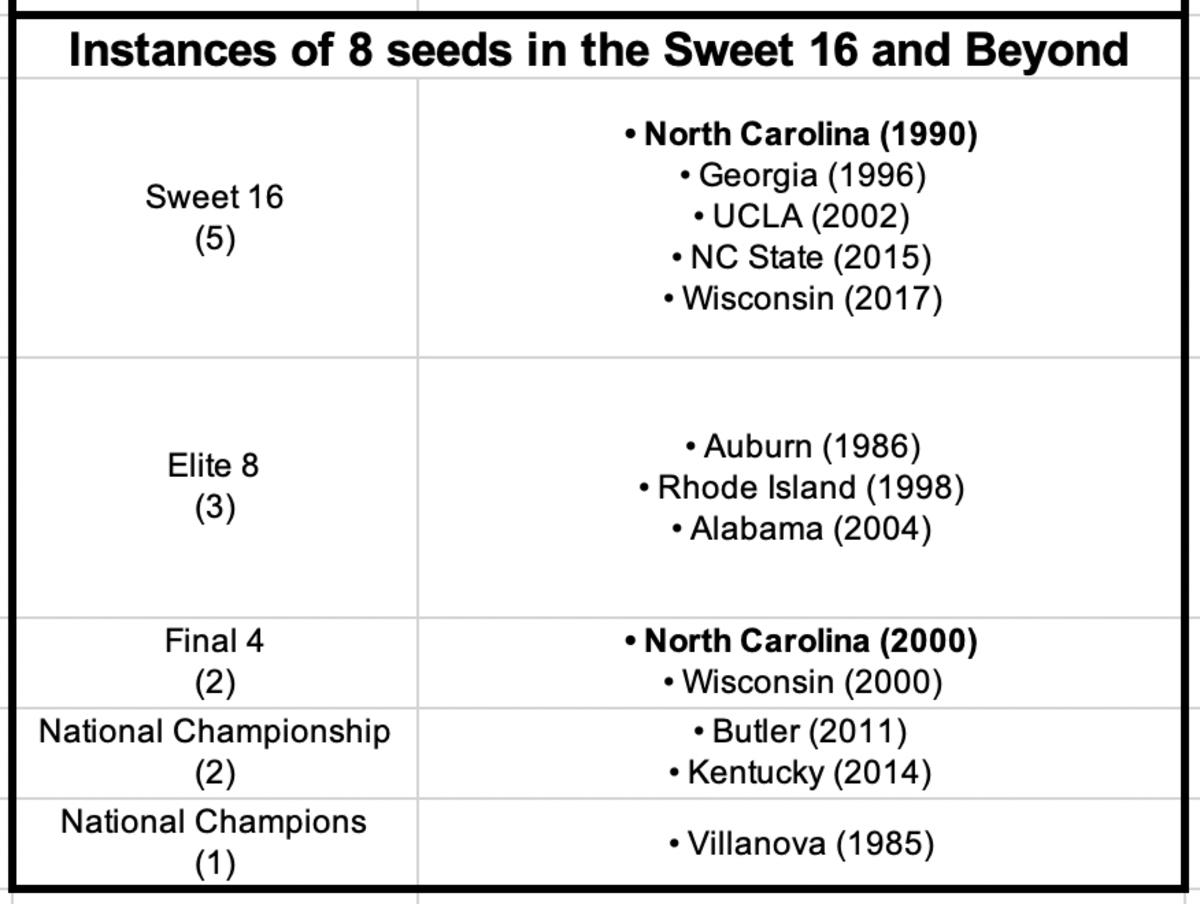UNC Basketball and the History of the Eight Seed
The North Carolina Tar Heels enter the 2021 NCAA Tournament as the eight seed in the South bracket. UNC will take on the ninth-seeded Wisconsin Badgers out of the Big Ten on Friday, March 19. The winner will subsequently play the winner of top-seeded Baylor and Hartford on Sunday, March 21.
Given Carolina’s placement as an eight seed, it’s a great time to look at the historical success of eight seeds as well as the Tar Heels’ success when slotted onto the eight line.
The scope for our examination will date back to the 1985 tournament, when the field expanded to 64 teams. This data set will provide the most comparable intel and is therefore a great starting point.
Historical Success of the Eight Seeds
In the modern era of the NCAA Tournament (1985-present), there have been a total of 37 seasons. That number, however, includes this year, in which a tournament is yet to be played, and last year, in which a tournament was never played. Our data for examining the historical success of eight seeds therefore yields 35 years’ worth of NCAA Tournaments with four teams in each, which equals 140 different teams.
Thanks to my crack research team (translation: “me”), I have gathered all 35 years of the data concerning eight seeds and distilled it down to some bite size chunks for you to devour. Ready for the results?
Let’s group the teams into one of the following three basic categories:
- Lost in the First Round
- Lost in the Second Round
- Made the Sweet 16 or beyond
The 140 teams broke up into those three groups as follows:
- 72 of the 140 teams lost in the first round (51.43 percent). That means that the teams seeded ninth have actually (barely) won more of the First Round 8-9 matchups. Granted, the count is close enough at a record of 72-68, that the eights could tie things up with a clean sweep this year.
- Of the 68 intrepid eight seeds who defeated nine seeds in the First Round, 55 of those lost in the Second Round (39.29 percent of the total 140 eight seed teams; 80.88 percent of the eight seeds that made the Second Round). Why did such a high volume of these teams lose their Second Round game? It’s simple. Who awaits the winner of the 8-9 games? That’s right, the one seed. Literally every time an eight seed has defeated a nine, they’ve faced a one seed in the Second Round. If you’re confused why I’m not accounting for the UMBC over Virginia upset in 2018, the reason that’s not included here is that UMBC didn’t face an eight seed; they faced the ninth-seeded Kansas State Wildcats, so the result is not germane to this discussion. However, while we’re on the topic, how about a trivia question? What historically great program did Kansas State beat in the Sweet 16 that year before losing to a Final Four-bound Cinderella team in the Elite Eight? Follow-up: Who was the Final Four-bound Cinderella team? Answers: Kentucky and Loyola-Chicago.
- If you’ve been doing your math, you realize that there are just 13 teams remaining who made it to the Sweet 16 or beyond. That number equals out to just 9.29 percent of all eight seeds making it that far. Of the 13, five lost in the Sweet 16, three lost in the Elite Eight, two lost in the Final Four, two were the National Runners-Up and one won the National Championship.
There’s a curious phenomenon with eight seeds as compared to a lower-seeded team not facing a one seed. Let’s use a 10 seed as an example:
Eight seeds make it to the Second Round more often than 10 seeds (68 teams [48.57 percent] to 55 teams [39.29 percent]).
However, 10 seeds make it beyond the second round more often than eight seeds (23 teams [16.43 percent] to 13 teams [9.29 percent]).
Why is this true? Because, again, eight seeds have to play one seeds in the Second Round, while 10 seeds “get” to play two seeds in the Second Round (aside from the rare 15 over two upset). Although there is not much difference between a one seed and a two seed, there is enough separation between the two seed lines to make a difference in the game results.
Additionally, even though nine seeds have upended eight seeds by a slight advantage in the First Round (72-68), more eight seeds have gone to the Sweet 16 or beyond by almost double (13-7).
North Carolina as an Eight Seed
The numbers above are daunting, at least in terms of having any hope for North Carolina to make a sustained run as an eight seed. Reminder: just 13 of the 140 eight seeds have ever made it to the Sweet 16; that’s just 9.29 percent.
Here’s where I swoop in with some good news: The Tar Heels have actually experienced success as an eight seed. 2021 marks Carolina’s fourth appearance as an eight seed. In all three previous instances, they won their first game. Amazingly, in two of those three instances, UNC then went on to beat the one seed to advance to the Sweet 16.
The first of these two historic upsets was in 1990 when Rick Fox received a pass from current Assistant Coach Hubert Davis and drove baseline for the game-winning layup over Oklahoma as time expired.
The second upset was over Stanford in 2000, led by senior Ed Cota. Cota was joined in the starting lineup by Joseph Forte, Brendan Haywood, Kris Lang, and Jason Capel. That team also included the freakishly-athletic Julius Peppers. Freshman phenom Forte capped the scoring with a run-out dunk, giving the Tar Heels a 60-53 victory.
Carolina is one of only two schools to make the Sweet 16 or beyond as an eight seed. Who’s the other school? You guessed it, their upcoming opponent, the Wisconsin Badgers.
Even more interesting, in 2000, both North Carolina and Wisconsin made the Final Four, both as eight seeds.
What follows are the results of UNC’s previous three NCAA Tournament appearances as an eight seed:
1990
- First Round: Win | SW Missouri State | 9 seed | 83-70
- Second Round: Win | Oklahoma | 1 seed | 79-77
- Sweet 16: Loss | Arkansas | 4 seed | 73-96
2000
- First Round: Win | Missouri | 9 seed | 84-70
- Second Round: Win | Stanford | 1 seed | 60-53
- Sweet 16: Win | Tennessee | 4 seed | 74-69
- Elite 8: Win | Tulsa | 7 seed | 59-55
- Final 4: Loss | Florida | 5 seed | 59-71
2013
- First Round: Win | Villanova | 9 seed | 78-71
- Second Round: Loss | Kansas | 1 seed | 58-70
Here is a list of the 13 eight seeds who have made it to the Sweet 16 or beyond (including year and how far the team advanced):

Will this year’s North Carolina team be able to maintain the success the Tar Heels have found as an eight seed? Will they be able to keep intact Roy Williams’ streak of never losing in the first round (29-0 all time)? Only time will tell.
